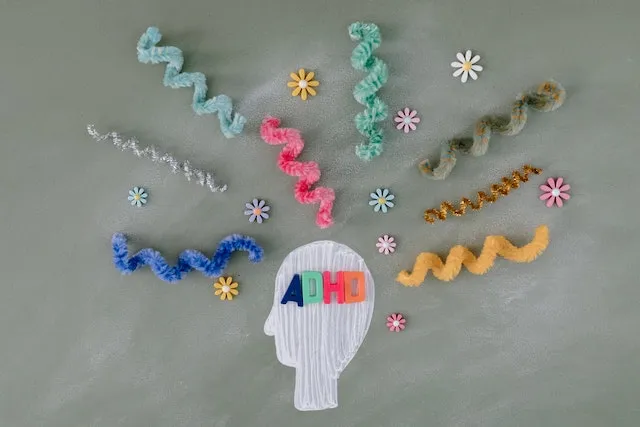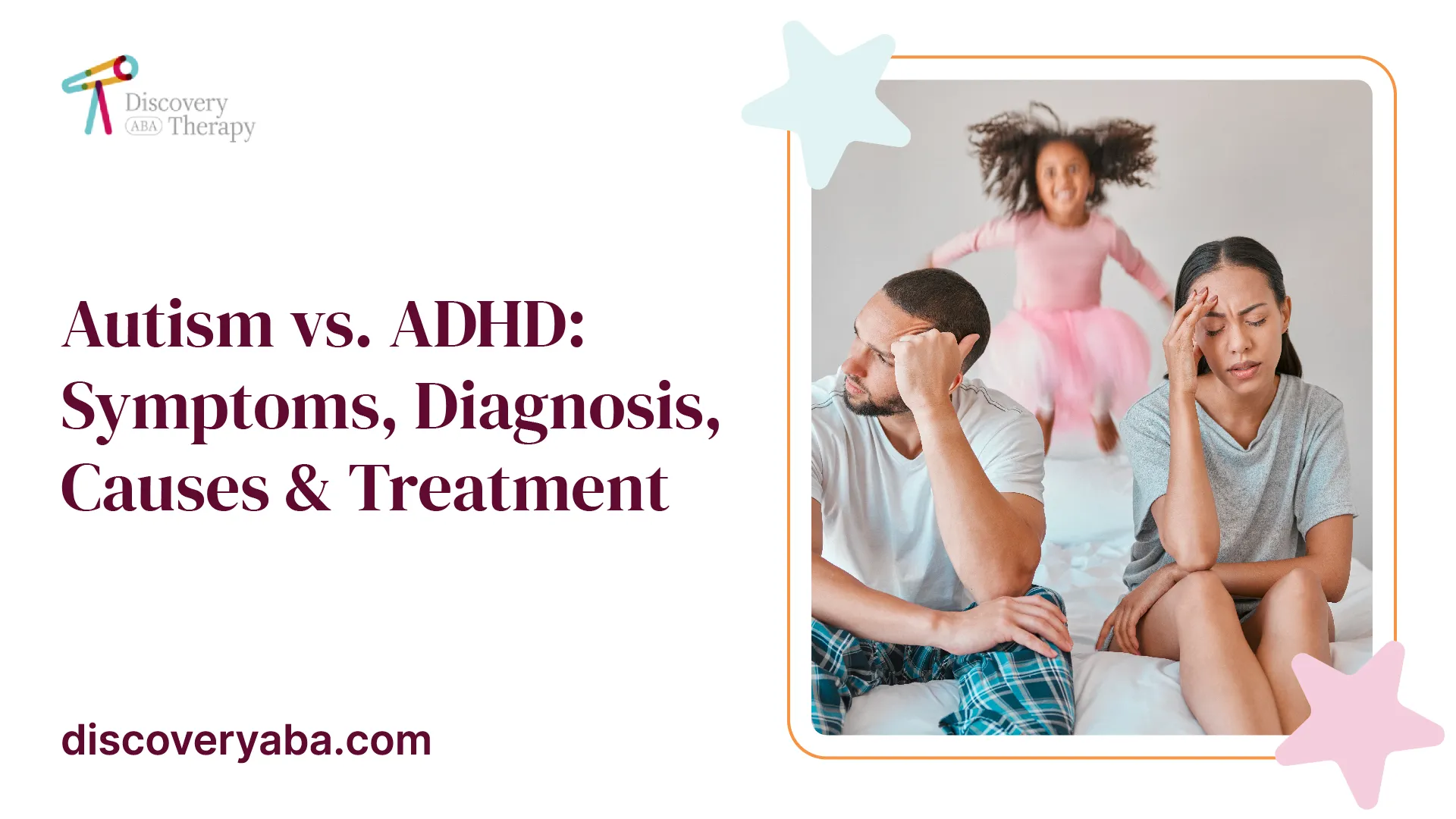Autism vs. ADHD: Symptoms, Diagnosis, Causes & Treatment
Autism and ADHD are two neurological disorders that are often confused with each other. While they share some similarities, they are distinct conditions with different symptoms, causes, and treatments.


Symptoms
Autism is a developmental disorder that affects communication, social interaction, and behavior. The symptoms of autism can vary widely, but some common signs include:
- Difficulty with social interaction, such as making eye contact or understanding social cues
- Repetitive behaviors or routines, such as lining up toys or repeating words or phrases
- Sensory sensitivities, such as being bothered by certain sounds or textures
- Delayed language development or difficulty with communication
- Difficulty with imaginative play or making friends
ADHD, on the other hand, is a condition that affects attention, hyperactivity, and impulsivity. The symptoms of ADHD can include:
- Difficulty paying attention or staying focused
- Hyperactivity, such as fidgeting or constantly moving
- Impulsivity, such as interrupting others or acting without thinking
- Difficulty with organization or completing tasks
- Forgetfulness or losing things frequently
Causes
The causes of autism and ADHD are not fully understood, but research suggests that both conditions may have genetic and environmental factors.Autism is believed to be caused by a combination of genetic and environmental factors. Studies have shown that certain genes may increase the risk of developing autism, but environmental factors such as exposure to toxins or infections during pregnancy may also play a role.
A new study has found that chemicals linked to autism are present in crib mattresses. The study, which was published in the journal Environmental Science & Technology, found that crib mattresses contained high levels of volatile organic compounds (VOCs), and that these VOCs were associated with an increased risk of autism.
ADHD is also believed to have a genetic component, but environmental factors such as exposure to lead or prenatal alcohol exposure may also increase the risk of developing the condition.
Treatment
There is no cure for autism or ADHD, but there are treatments that can help manage the symptoms of these conditions.
For autism, early intervention is key. Behavioral therapy, speech therapy, and occupational therapy can help improve communication, social skills, and behavior. Medications may also be used to manage symptoms such as anxiety or hyperactivity.
For ADHD, medications such as stimulants or non-stimulants are often used to improve attention and reduce hyperactivity and impulsivity. Behavioral therapy can also be helpful in teaching organizational and time-management skills.
Frequently Asked Questions About Autism and ADHD
Can autism and ADHD occur together?
Yes, it is possible for someone to have both autism and ADHD. In fact, research suggests that up to 80% of children with autism also have symptoms of ADHD.
Are there any alternative treatments for autism or ADHD?
While there are no alternative treatments that have been proven to cure or treat autism or ADHD, some people may find complementary therapies such as yoga, meditation, or dietary changes helpful in managing their symptoms.
What is the difference between high-functioning autism and Asperger's syndrome?
High-functioning autism and Asperger's syndrome were once considered separate diagnoses, but they are now both included under the umbrella term of Autism Spectrum Disorder (ASD). However, some people still use the term "Asperger's syndrome" to refer to individuals with high-functioning autism who do not have significant delays in language development.
Can adults be diagnosed with autism or ADHD?
Yes, adults can be diagnosed with both conditions. In fact, many people with autism or ADHD may not receive a diagnosis until adulthood.
Is it possible for someone to outgrow their symptoms of autism or ADHD?
While some people may experience a reduction in their symptoms over time, it is unlikely that someone will completely outgrow their diagnosis of autism or ADHD. However, early intervention and treatment can help manage symptoms and improve quality of life for individuals with these conditions.
Is ADHD more common than autism?
Autism and ADHD are both relatively common conditions, but autism is generally considered to be less common than ADHD.
According to the Centers for Disease Control and Prevention (CDC), approximately 1 in 54 children in the United States has been diagnosed with autism, while approximately 1 in 10 children has been diagnosed with ADHD.
However, it's important to note that both conditions can be challenging to diagnose and may be underreported in some populations. Additionally, some individuals may have symptoms of both conditions or may have a misdiagnosis due to overlapping symptoms.
Potential Benefits & Drawbacks of Medication for Treating Autism and ADHD
While medication is not a cure for autism or ADHD, it can be helpful in managing some of the symptoms associated with these conditions. However, there are both benefits and drawbacks to using medication as a treatment option.
Benefits of Medication
For individuals with ADHD, medications such as stimulants or non-stimulants can improve attention and reduce hyperactivity and impulsivity. This can help individuals better focus on tasks, complete them more efficiently, and improve overall performance in school or work settings.
For individuals with autism, certain medications can be used to manage symptoms such as anxiety or aggression. Antidepressants or antipsychotics may also be used in some cases to treat co-occurring conditions such as depression or bipolar disorder.
Drawbacks of Medication
While medication can be helpful in managing symptoms, there are also potential drawbacks to consider. Some common side effects of ADHD medications include loss of appetite, sleep disturbances, and irritability. In rare cases, these medications may also increase the risk of heart problems or psychiatric issues.
For individuals with autism who take medication, side effects may include weight gain, sleep disturbances, or an increased risk of seizures. Additionally, some medications may interact negatively with other treatments or exacerbate certain symptoms.
It is important for individuals considering medication as a treatment option for autism or ADHD to weigh the potential benefits against the potential risks and discuss any concerns with their healthcare provider. It is also important to note that medication should never be the only treatment approach; behavioral therapy and other interventions should also be considered as part of a comprehensive treatment plan.
Supporting Children With Autism Or ADHD
Parents play a crucial role in supporting their children with autism or ADHD. Here are some strategies that can help:
Establish routines and structure
Children with autism or ADHD often benefit from having clear routines and structure in their daily lives. This can help them feel more secure and reduce anxiety. Parents can establish consistent schedules for meals, homework, bedtime, and other activities to provide a sense of predictability.
Provide clear instructions and expectations
Children with autism or ADHD may have difficulty following complex instructions or understanding social cues. Parents can help by breaking tasks down into smaller steps and providing clear, concise instructions. It can also be helpful to set clear expectations for behavior and consequences for not meeting those expectations.
Use positive reinforcement
Positive reinforcement can be a powerful tool in encouraging desired behaviors. Parents can praise their child's efforts and progress, offer rewards for good behavior, and use visual aids such as sticker charts to track progress.
Work with teachers and healthcare providers
Collaboration between parents, teachers, and healthcare providers is essential in creating a supportive environment for children with autism or ADHD. Parents should communicate regularly with their child's teacher about any concerns or accommodations that may be needed. Healthcare providers can also offer guidance on treatment options and strategies for managing symptoms.
Practice self-care
Parenting a child with autism or ADHD can be challenging, so it's important for parents to take care of themselves as well. This may include seeking support from friends or family members, practicing stress-reducing activities such as meditation or exercise, or seeking counseling if needed.
By implementing these strategies at home and working collaboratively with schools and healthcare providers, parents can help support the success of their child with autism or ADHD both academically and socially.
Conclusion
In conclusion, while autism and ADHD share some similarities, they are distinct conditions with different symptoms, causes, and treatments. If you or a loved one is experiencing symptoms of either condition, it is important to seek a professional evaluation and treatment.
Does Your Child Have An Autism Diagnosis?
Learn More About How ABA Therapy Can Help
Find More Articles
Contact us
North Carolina, Nevada, Utah, Virginia
New Hampshire, Maine
Arizona, Colorado, Georgia, New Mexico, Oklahoma, Texas
.avif)




































































































